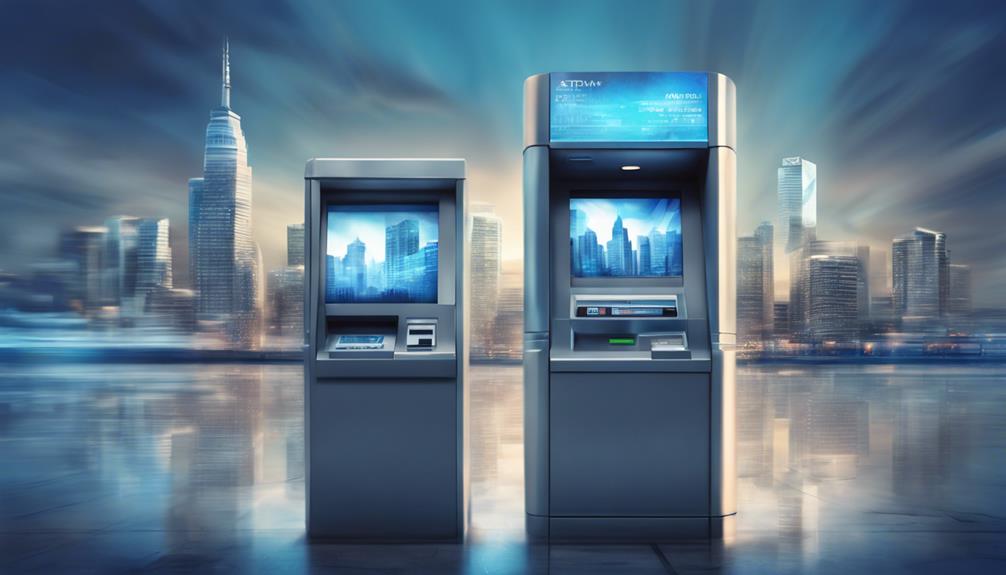Cryptocurrencies What Is It

You've probably heard about cryptocurrencies like Bitcoin and Ethereum, but you might still be wondering what they really are.
Essentially, cryptocurrencies are digital currencies that operate independently of traditional banks, using secure encryption techniques for transactions.
As you explore their potential, consider how this technology could change the way you think about money.
Could you imagine a world where digital currencies are as common as cash or credit?
The implications on global finance and personal transactions are profound and worth considering further.
What impact could this shift have on your financial dealings and privacy concerns?
Understanding Cryptocurrency

Cryptocurrency is a digital or virtual currency, such as Bitcoin or Ethereum, that securely facilitates transactions using cryptography on decentralized networks like blockchain technology.
This innovative form of payment allows you to be part of a community that's shaping the future of finance, moving away from traditional banking systems like JPMorgan Chase & Co.
When you transfer cryptocurrency, it occurs without the need for intermediaries. This decentralized nature not only speeds up transactions but also reduces costs, making it an attractive alternative for everyday payments.
Your digital wallet stores cryptocurrencies like Bitcoin, functioning much like a bank account but under your complete control. It's empowering to manage your own financial assets without relying on traditional financial institutions.
Every transaction you make, every payment you receive or send is recorded on the blockchain, ensuring security and transparency.
You're not just using a digital currency; you're participating in a financial revolution. As demand for Bitcoin and other cryptocurrencies fluctuates, so does their value, offering both opportunities and risks in this dynamic market.
How Cryptocurrency Works
To understand cryptocurrency functions, you must first grasp the role of blockchain technology in verifying and recording transactions. You're part of a revolution in how value is exchanged.
Imagine blockchain as a massive ledger, but unlike traditional ledgers, this one's spread across thousands of computers, termed nodes. Each node has a copy of the ledger, making the data highly resilient to tampering.
Every time you use your cryptocurrency wallet to perform a transaction, that transaction is broadcast to a network of computers using blockchain technology. These computers then work together, using consensus mechanisms, to verify the transaction's legitimacy. Think of it as a community agreement—everyone must concur that your transaction is genuine.
Once verified, your transaction is combined with others into a new block. This block is then permanently added to the existing blockchain, providing a transparent and immutable record. It's these features that assure you that your digital or virtual currency remains secure.
Throughout this process, the goal of blockchain is to allow digital information to be recorded and distributed, but not altered. That's what empowers cryptocurrencies in a digital era, turning you into your own bank, shielded from traditional vulnerabilities.
Types of Cryptocurrency

Cryptocurrency, a digital or virtual currency secured by cryptography, exists in various forms, each serving distinct functions and supporting diverse technologies.
Bitcoin (BTC), the first cryptocurrency, launched a revolutionary wave through its use of cryptographic techniques, setting a foundation for trust and security in digital transactions.
Types of Cryptocurrency
Payment Cryptocurrencies:
Bitcoin (BTC) is a general-purpose digital payment method with a dedicated blockchain and limited coin supply, making it deflationary.
Litecoin is similar to Bitcoin but with a faster block time and different hashing algorithm.
Monero is known for its enhanced privacy features.
Dogecoin was initially created as a joke, but it has since gained a significant following and real-world use.
Bitcoin Cash (BCH) was created in 2017 as a fork of Bitcoin, allowing for more transactions per block.
Tokens:
Utility Tokens:
Ether (ETH) runs on the Ethereum blockchain, used for smart contracts, decentralized apps (DApps), and transaction fees.
Storj is a utility token that rents unused hard drive space, enabling decentralized data storage.
Binance Coin (BNB) grants holders discounted trading fees and supports decentralized financial use cases.
Security Tokens represent fractional ownership or capped supply, such as tokenized stocks.
Stablecoins:
Tether (USDT) is pegged to the value of the U.S. dollar, designed for price stability.
USD Coin (USDC) is a stablecoin also pegged to the U.S. dollar, used for liquidity and price stability.
Central Bank Digital Currencies (CBDCs):
Issued by central banks, these digital counterparts of traditional currencies like the U.S. dollar, Euro, or Yuan are still emerging.
Features and Purposes
Smart Contracts:
Automated agreements that execute based on specific conditions, enabling decentralized decision-making.
Decentralized Applications (DApps):
Run on blockchain networks and provide decentralized services, often using tokens to facilitate interactions.
Cryptographic Techniques:
Ensure the security and trustworthiness of digital transactions and data, making it difficult to counterfeit or double-spend.
Blockchain Networks:
Decentralized ledgers that record transactions and ensure data integrity, making them a critical component of cryptocurrencies.
Investment and Trading
Cryptocurrency Exchanges:
Online platforms where various digital assets are bought, sold, and traded, a crucial part of the digital asset ecosystem.
Wallets:
Secure digital storage solutions for cryptocurrencies, ensuring secure ownership and control.
Understanding the Landscape
Altcoins:
Any cryptocurrency that isn't Bitcoin, such as Ethereum, Tether, or Solana.
Forks:
Changes in the software code that can lead to the creation of new cryptocurrencies, as seen with Bitcoin Cash.
Mining:
A process that uses computational power to solve complex mathematical puzzles, often rewarding miners with new cryptocurrency.
Security and Risks
While blockchain technology enhances security, it's important to recognize that cryptocurrencies aren't immune to cyber threats and can be vulnerable to high-stake hacks.
Your digital wallet, which stores your cryptocurrency, relies on multiple layers of encryption algorithms to safeguard your assets. However, security isn't just about the technology; it's about being part of a community that values proactive measures against potential risks.
Entities: Digital Wallet, Cryptocurrency, Cyber Threats, Encryption Algorithms
Two-factor authentication is a critical step in securing your transactions within decentralized networks.
You've got to be vigilant, as mobile devices, often the backbone of our daily crypto interactions, are hotspots for security breaches. Whether it's malware or phishing, these threats can siphon off crucial information, leading to financial losses and even identity theft.
It's crucial you stay updated on mobile security trends and use strong, unique passwords to prevent threats like CL0P ransomware and stalkerware.
Entities: Decentralized Networks, Mobile Devices, Malware, Phishing, Financial Losses, Identity Theft, CL0P Ransomware, Stalkerware
Investing in Cryptocurrency

Investing in cryptocurrency offers diverse opportunities, but it also requires careful strategy and understanding of market trends.
When you dive into the world of cryptocurrencies, you're joining a community that's at the forefront of modern financial assets. Buying cryptocurrency can be exciting; it's like you're becoming part of an exclusive club where everyone is keyed into future possibilities.
Firstly, understanding the asset class of crypto is crucial. This market is highly speculative and can see swings that traditional stocks do not.
Therefore, getting familiar with popular cryptocurrency options such as Bitcoin, Ethereum, and Litecoin, and how they differ is essential. Each has unique features and uses that could match different aspects of your digital lifestyle.
Crypto exchanges such as Binance, Coinbase, and Kraken are your gateway to investing in cryptocurrency.
These platforms allow you to buy, sell, and sometimes even use cryptocurrency for everyday transactions. However, the choice of the platform should align with your security needs and investment goals.
Always remember, as thrilling as it's to be part of this cutting-edge asset class, the value of crypto can be incredibly volatile.
Frequently Asked Questions
What Is Cryptocurrency and How Does It Work?
Cryptocurrency is a digital, decentralized, and encrypted form of money that operates independently of a central bank. It employs cryptography to secure transactions, control the creation of new units, and verify the transfer of assets. This virtual currency exists solely in electronic form, allowing peer-to-peer transactions without the need for intermediaries like banks. Transactions are recorded on a public ledger called a blockchain, which is maintained by a distributed network of computers rather than a single authority. This decentralized system ensures that no single entity controls the currency. Users can leverage digital wallets to store, send, and receive cryptocurrencies, which are protected by private keys and secured through encryption techniques like elliptical curve encryption, public-private key pairs, and hashing functions. With decentralized finance applications, users can hold, stake, or loan cryptocurrencies to potentially earn rewards or interest. While not government-backed, cryptocurrencies have drawn significant attention from both investors and companies due to their potential to disrupt traditional financial systems.
Is Crypto Real Money?
Crypto isn't traditional money, but it's considered real money in its own right. It fits the definition of money as a medium of exchange, a measure or store of value, and a unit of account. You can buy, sell, and trade it, just like cash. It's part of a community that values privacy and direct control over finances.
How Does Crypto Make You Money?
Crypto earns you money through staking rewards, mining, price appreciation, and dividends from certain coins. You'll also find income through lending on decentralized finance (DeFi) platforms, integrating you into a thriving, supportive financial community. Users can earn passive income by staking their digital assets, which helps secure blockchain transactions, or by lending them on DeFi platforms. Additionally, owning cryptocurrencies with staking capabilities, such as Ethereum or Solana, can generate passive income without the need for selling. Furthermore, some platforms, like Binance and Coinbase, offer staking services that can provide income.
What Is the Purpose Behind Cryptocurrency?
Cryptocurrencies are digital assets that are secured by cryptography and function primarily as a decentralized financial system. This decentralized structure allows them to exist outside the control of governments and central authorities, ensuring secure, fast, and borderless transactions, as well as the potential for growth in assets beyond traditional banking's reach.
Conclusion
You've explored the dynamic world of cryptocurrencies, from their fundamentals to their various types, and how they operate.
Cryptocurrencies are digital or virtual tokens secured by cryptography, enabling secure online transactions without third-party intermediaries.
They rely on blockchain technology, a decentralized ledger that ensures transparency and immutability.
Bitcoin, Ethereum, and Litecoin are notable examples of popular cryptocurrencies.
Now that you know the risks and the security features embedded in cryptocurrencies, including encryption algorithms and two-factor authentication, and understand how to invest in them, you're better equipped to navigate this digital landscape.
As you consider stepping into cryptocurrency investments, remember to stay informed and cautious, leveraging your newfound knowledge to make decisions that align best with your financial goals.





